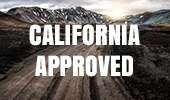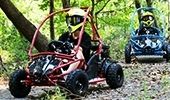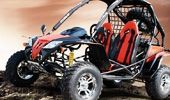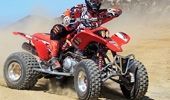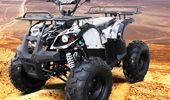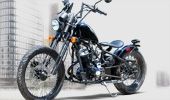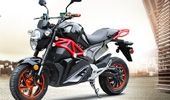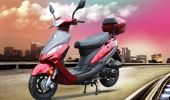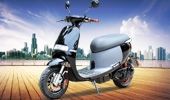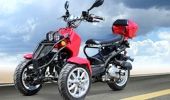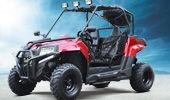Scooters are a fun and practical way of getting around Seattle. However, it wouldn't be fun at all if you got ticketed for breaking one of the state rules regarding riding and using a scooter. Fortunately, the laws aren't particularly complicated, but be sure to know what they are before you take to the streets.
What Is a Scooter?

Image via Flickr by pasa47
Scooters that have motors with a displacement 50 cubic centimeters or less are considered "mopeds" in Washington state. Drivers of these small scooters must follow the laws that apply to mopeds. Scooters that have motors larger than 50cc, for example, 150cc scooters, are considered motorcycles in Washington with respect to the law, and the same laws that apply to motorcycles apply to these larger scooters.
Regardless of the size of the engine, a vehicle is considered a scooter in Washington if it meets the following requirements:
- It has two wheels.
- It has an electric or liquid fuel motor.
- It has a step-through frame.
1. Licenses and Endorsements
You will need a valid, up-to-date driver's license to operate a scooter of any size anywhere in Washington. You also must register your scooter and display a valid license plate on the vehicle. Motorcycle insurance is not required with either scooter size, although it's wise to buy it as a precaution, if you can afford it.
With large scooters, because motorcycle laws apply, you will need a motorcycle endorsement added to your driver's license. Alternatively, a motorcycle permit can be acquired, but these are only active for 90 days at a time and do not allow you to ride after dark or carry passengers. You do not need a motorcycle endorsement or permit in order to operate a scooter of 50cc or less.
2. Safety and Passenger Protection
In order to legally operate a scooter in Washington, both you and your passengers must wear USDOT-approved helmets, meaning helmets deemed suitable by the United States Department of Transportation. Most motorcycle and powersports helmets meet USDOT requirements. If you're unsure, though, look closely at the outside of the helmet. You will usually see a mark that says "DOT approved" on the back. Unlike some other states, Washington has no restrictions on in-helmet speakers.
Another important safety requirement is eye protection. Unless your moped has a windshield, you and your passengers must wear secure and suitable eye protection. Also, if you are operating an over-50cc scooter, any passengers riding with you must have both a seat and footrests for themselves.
3. Where You Can Ride
Small scooters or mopeds do not have the same access as large scooters or motorcycles, and you may not ride the former on fully-controlled limited access highways or freeways. Common neighborhood streets and roads, however, are acceptable for small scooter traffic, unless noted otherwise with signage.
Other places where you may not ride a 50ccc scooter are:
- Sidewalks.
- Bicycle paths.
- Equestrian trails.
- Hiking/recreation trails.
These restrictions typically apply to large scooters as well. The most important difference is that over-50cc scooters, being treated as motorcycles, are able to enter limited-access highways.
Keep in mind that in addition to regular rules of the road, large scooters and motorcycles are not allowed to pass between lanes in Washington, although they may pass on the left in the leftmost lane. Also, up to two motorcycles or large scooters may share a lane at once.
4. Parking Your Scooter
Parking laws are almost identical between all scooter sizes, motorcycles, etc. Regardless of scooter size, you may park in:
- Any designated motorcycle parking spaces of Seattle.
- Any restricted parking zones, a.k.a RPZs. Scooter users do not need an RPZ permit.
- Any time-restricted parking space and/or paid space, provided payment was received and time limits are respected.
- Any unrestricted parking space a passenger car could legally park in, with a 72-hour limit.
5. Pollution Control and Muffling
Finally, the last key scooter law is about pollution, both noise and environmental. By Washington state law, it is illegal to remove any muffling parts or pollution control devices from your small scooter or moped. Similar laws apply to large scooters and motorcycles, in that all vehicles manufactured after 1985 must not have a sound level above 86 decibels at 50 feet of 105 decibels at 20 inches.
In general, riding a scooter in the streets of Seattle is much like riding a motorcycle through the city, only with restrictions on highway access if your scooter is smaller. You will be expected to follow similar rules as those of a motorcycle or moped driver, but they are not exactly the same. The good news is that with a little preparation, you're sure to have a good time without getting chewed out by the local police. Stay safe out there and have fun!






